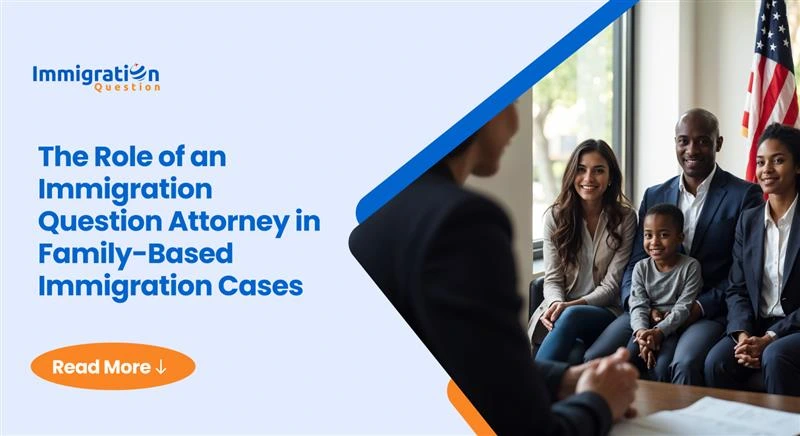Family-based immigration plays a crucial role in the U.S. immigration system, and thanks to Immigration Question attorneys, families can reunite and build their lives together. It is one of the most common pathways for many immigrants to obtain lawful permanent residence in the United States.
However, the process requires applicants to meet strict legal requirements, submit detailed documents, and comply with numerous immigration policies. Applicants may face delays or legal complications without proper guidance.
The role of a family-based immigration attorney is indispensable. An experienced attorney ensures that families follow the correct steps to increase their chances of a successful outcome.
This blog will explore how an Immigration Question attorney assists in family-based immigration cases and why hiring one is essential.
What is Family-Based Immigration?
Family-based immigration allows U.S. citizens and lawful permanent residents to sponsor certain family members for immigration benefits. The type of visa available depends on the applicant’s relationship with the sponsoring family member.
There are two main categories of family-based immigration:
-
Immediate Relatives
Immediate relatives of U.S. citizens receive priority processing, often within one year. This category includes:
- Spouses of U.S. citizens
- Unmarried children under 21 of U.S. citizens
- Parents of U.S. citizens if the petitioner is 21 or older
-
Family Preference Categories
Other eligible family members fall under preference categories, with longer wait times due to annual visa limits. These include:
- Unmarried adult sons and daughters of U.S. citizens
- Spouses and unmarried children of lawful permanent residents
- Married sons and daughters of U.S. citizens
- Brothers and sisters of adult U.S. citizens
Since processing times vary, applicants must carefully plan their immigration strategy. A family-based immigration attorney can help assess eligibility, explain the legal requirements, and ensure all documents are properly prepared.
A Breakdown of The Family-Based Immigration Process
The family-based immigration involves multiple steps, strict requirements, and long processing times. Working with a Family-Based Immigration Attorney can help ensure a smooth application process and minimize delays.
Step 1: Filing the I-130 Petition
The process begins when a U.S. citizen or lawful permanent resident, the petitioner, submits Form I-130, Petition for Alien Relative, to U.S. Citizenship and Immigration Services (USCIS). This form establishes the family relationship between the petitioner and the applicant.
Once USCIS accepts the petition, a priority date is assigned, determining the applicant’s place in line for visa approval. Immediate relatives of U.S. citizens, such as spouses, unmarried children under 21, and parents, experience faster processing times. At the same time, those in family preference categories may face longer wait periods due to annual visa limits.
Step 2: Visa Processing and Adjustment of Status
The next step depends on whether the beneficiary is inside or outside the United States:
- Applicants Residing Abroad: Those outside theof the U.S. must wait for USCIS approval before applying for a visa through the National Visa Center (NVC) and attending a consular interview in their home country.
- Applicants in the U.S.: If the beneficiary is already in the U.S. on a valid nonimmigrant visa, they may be eligible to apply for an adjustment of status (Form I-485) to become a permanent resident without leaving the country.
Step 3: Financial Sponsorship Requirement
The petitioner must file an Affidavit of Support (Form I-864), proving they have enough financial resources to support the applicant and prevent them from becoming a public charge. A family-based immigration attorney can help sponsors meet the financial requirements and submit the necessary evidence.
Step 4: Interview and Final Decision
All applicants must attend an immigration interview with USCIS or at a U.S. embassy abroad. During the interview, immigration officials assess the authenticity of the relationship and verify the applicant’s eligibility for a visa. A family-based immigration attorney can help applicants prepare for this step.
Step 5: Conditional Residency for Spouses
For marriage-based petitions, if the couple has been married for less than two years at the time of approval, the immigrant spouse receives conditional permanent residency. To remove the conditional status, both spouses must jointly file Form I-751 within 90 days before the second anniversary of the immigrant spouse’s U.S. entry.
How an Immigration Attorney Helps in Family-Based Immigration Cases
Applying for a family-based visa involves a lot. An Immigration Question attorney offers professional guidance throughout the process, ensuring applicants meet all necessary criteria.
-
Case Assessment and Professional Advice
Immigration attorneys evaluate each family’s circumstances and recommend the best immigration pathway. They also help determine which visa category suits an applicant’s situation and clarify their legal rights and responsibilities.
-
Accurate Document Preparation
The U.S. immigration system requires extensive documentation, including:
- Proof of relationship, such as marriage certificates and birth certificates
- Financial support affidavits
- Identity verification documents
- Additional supporting evidence
Missing documents can result in rejection or a request for additional evidence (RFE). An immigration attorney ensures all paperwork is complete before submission.
-
Communication with USCIS and Government Agencies
Maintaining interactions with USCIS and other immigration agencies can be challenging. Attorneys handle these communications, responding to inquiries, clarifying documentation requirements, and following up on case statuses.
-
Preparation for Visa Interviews
Visa interviews at U.S. embassies can be stressful. Immigration attorneys prepare clients for potential questions, ensuring they confidently answer inquiries about their case. In some situations, attorneys may even accompany clients to interviews for additional support.
-
Overcoming Immigration Challenges
Family-based immigration cases often face hindrances such as:
- Visa denials due to insufficient evidence
- Delays due to administrative backlogs
- Issues related to inadmissibility, including criminal records, medical conditions, or past immigration violations.
A family-based immigration attorney can help resolve these issues by filing legal motions, responding to RFEs, or appealing denials.
-
Ensuring Compliance with Immigration Laws
Even after obtaining a visa or green card, applicants must comply with U.S. immigration laws. Attorneys provide guidance on maintaining legal status, renewing green cards, and applying for U.S. citizenship.
Failure to comply with legal requirements can lead to deportation. An Immigration Question attorney ensures families remain compliant with U.S. immigration policies.
Some applicants attempt to handle family-based immigration cases independently, believing they can save money or complete the process faster. However, the nature of U.S. immigration law makes this a risky decision.
Contact an Immigration Question Attorney Today
If you or a relative are pursuing family-based immigration, you need legal support. Experienced Immigration Question attorneys can help you understand your options, steer the visa process, and overcome legal challenges.
Visit ImmigrationQuestion.com to connect with verified immigration attorneys with strong reputations and memberships in organizations like the American Immigration Lawyers Association (AILA). These attorneys have years of experience handling complex immigration cases and will guide you through the process.











